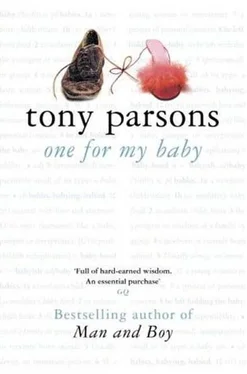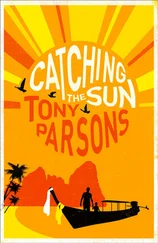When Josh and the other off-duty suits have finished waving their arms around, George announces that he is going to show us some pushing hands. I’ve never done pushing hands before, I have never even heard of it, but I try to look like I know what I’m doing when George asks me to help him demonstrate.
“Pushing hands,” he says. “Called toi sau in China. Not about strength. About feeling. For two peoples. Can be improvise. Can be set moves. About anticipate.”
That’s the introduction. George is not much of a talker. He prefers to show you rather than tell you.
I copy George. We face each other in a left bow-and-arrow stance-left leg forward and bent, representing a bow, right leg behind and straight, representing an arrow-and, following his example, I lightly place the back of my left wrist against the back of his left wrist. We are hardly touching.
He closes his eyes and slowly starts pushing his hand toward me. Somehow I know what to do. Staying in contact with his wrist, I turn my waist, rolling the back of my hand over his hand, letting him fully extend his arm, then I slowly push back toward him. He receives my force, goes with it, slowly brushes it aside. Our hands never lose contact.
It goes on. We push and yield and neutralize, push and yield and neutralize, and soon I trust myself enough to close my eyes too, letting go of everything around me, to forget about the suits and Josh and person-hours and thinking outside the box, to forget that we haven’t spoken since I disgraced myself at his dinner party, to forget about hospital waiting rooms where they tell you there’s nothing that can be done, to forget the mist on the bare trees and my swollen lips and my chipped tooth, to just feel the light touch of skin against skin, to embrace the giving and taking, relaxing into the ebb and flow, just feeling what I need to do, and becoming what I need to become.
Oranges for Christmas
SUDDENLY THE LITTLE WHITE FLAT is too much for my nan. Suddenly it is full of traps to remind you that it’s not the getting old that kills you. It’s the getting sick.
The stairs to her first-floor flat are all at once too steep. She needs to pause to catch her breath on the little half-landing, gasping for air as if she is drowning, her face raised to the ceiling. The bath is suddenly too high to get into without somebody supporting her, so my mother or Plum or one of my nan’s female neighbors-and all of her neighbors are female-has to be there to help her in and out of the water. And the wellmeaning bureaucrats of terminal illness are suddenly all knocking at her front door.
There is a cheerful district nurse who organizes a social worker, meals on wheels once a day and a scarred metal air tank that stands guard by my nan’s favorite chair.
My nan wants to please the district nurse, just as she always wants to please everyone, but the little white flat is her home and although she knows these people are just trying to be helpful, she does not approve of the commode provided by the social worker (“I’m not doing my business in that, dear, thanks all the same”), the fetid meals on wheels are left untouched (“I’ll just have a bit of toast, sweetheart”) and the air tank makes no difference at all to her fits of terrible breathlessness (“I think it’s empty, love”).
But she carries on. She meets her old female friends for coffee and cake and talk, and the talk, the human connection, the human thing, is the point of those meetings. She comes to my mother’s house for lunch on Sunday, she makes her daily trips to the local shops for the tiny supplies of white bread and “a nice bit of ham” that she seems to live on, plus the river of tea and the biscuit mountain.
When she starts to feel uncertain on her feet, the social worker kindly produces a walking stick. My nan rolls her eyes that it has come to this, and brandishes her walking stick in imitation of a doddery old pensioner, which is pretty funny coming from her at this time.
“Ooh, I remember the good old days,” she jeers, waving her walking stick, and we all laugh, even the social worker.
My nan faces cancer in exactly the same way that she has faced life-with good grace, with endless stoicism, with quiet humor.
As she would say herself, she doesn’t like to make a fuss.
Despite the nagging pain in her side from the tumor and despite the desperate battles for breath, for a while life seems to go on in the same old way. There are trips to the shops in the morning, some gentle housework in the afternoon and nights spent watching television, her favored programs circled in shaky blue ballpoint in the newspaper’s TV guide, forever tugging at my heart.
But in the middle of all this ordinary life, I become aware that something extraordinary is happening. The people who love my nan show that they are ready to walk though fire for her.
My mother and my father are there, of course, there every day, although rarely at the same time, and there are countless visits from elderly ladies who live in the nearby flats or who know my nan from the old neighborhood, the old house where my dad grew up, the Oranges for Christmas house, friends from the old life before children grew and husbands died and busy specialists said there was nothing that they could do.
Then there is Plum. Among my parents and the elderly friends, there is this awkward girl who has somehow formed a real bond with my grandmother. Enduring endless hours on trains to and from Bansted, night after night Plum sits with my nan watching the programs that have been circled in the TV guide and selections from her personal collection of wrestling videos featuring The Slab in all his large-breasted glory.
Plum holds my nan’s hand, strokes her forehead and brushes her thin, silver hair, as if this old woman is the most precious thing on the planet.
The district nurse and the social worker look in once a week, but I do not know how we would cope if my nan didn’t inspire so much affection in the people whose lives she has touched. If we had to rely on the kindness of the local council, everything would be lost.
Because someone has to be with my nan all the time now. It’s just too dangerous for her to be alone. We realize that she can lose consciousness at any moment. My nan still calls it “falling asleep,” but the doctor who comes around says these fainting spells are blackouts caused by a lack of oxygen to the brain.
One night I watch as my nan’s eyes close while she is staring at the news, without her usual running commentary of “ridiculous” and “disgusting.”
Her head suddenly drops, her mouth falls open and she pitches forward toward the little fireplace. Before I can move, Plum catches my nan, as Plum has caught her before, and very gently eases her back into her chair.
And after a while it becomes what we think of as normal, an unremarked-upon part of our lives, these blackouts that my nan waves away as nothing that a good night’s sleep couldn’t cure.
The staff room of Churchill’s International Language School is empty. It’s still early. There are a couple of students sneaking a joint down on Oxford Street but nobody is upstairs yet. I dump my shoulder bag on top of the coffee table, and a yellow flyer is lifted up by a gust of wind. The flyer is not one of ours. I pick it up and read it.
Dream Machine.
Cleaning your work place the old-fashioned way-
on hands and knees
There’s a line drawing of what looks like a fifties housewife with a feather duster, both sexy and domestic, like Samantha in Bewitched, and below that there are two telephone numbers. One is an out-of-town number, the other for a mobile. I recognize both of them.
Читать дальше












